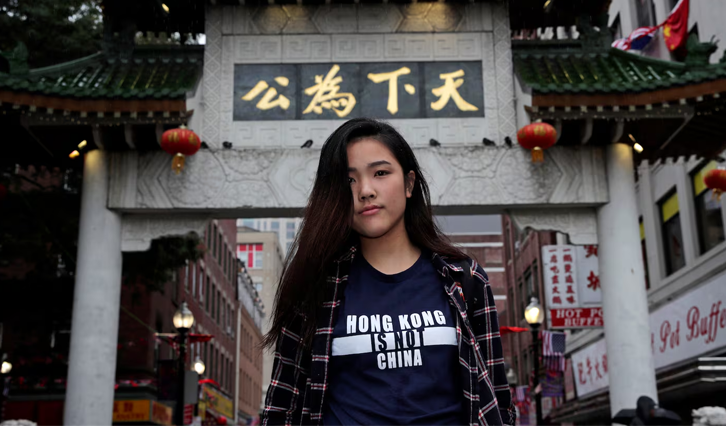How China hounds pro-democracy activists in Boston
Alicia Chen, the 2025 Elizabeth Neuffer Fellow, explores how pro-democracy dissidents in Boston face surveillance, harassment, and threats from the Chinese government.
Alicia Chen, the 2025 Elizabeth Neuffer Fellow, explores how pro-democracy dissidents in Boston face surveillance, harassment, and threats from the Chinese government.

Frances Hui in the Chinatown neighborhood of Boston.
Frances Hui, a 25-year-old activist who fled Hong Kong in 2019, has become one of the most vocal advocates for the city’s pro-democracy movement in the United States. But it has come at a cost.
While Hui was organizing a pro-democracy rally in Boston in 2019, a group of local Chinese people discussed in an internet chat group bringing weapons to the event, with one person threatening to “shoot her in the face,” Hui told me. Later, a Chinese man disrupted the rally and followed her back to her Emerson College dorm. In 2023, the Hong Kong police, which are controlled by the Chinese government, issued a warrant for her arrest on charges of colluding with foreign forces. In April, her mother in Hong Kong was detained for questioning for a second time.
“It was heart-wrenching to see my aging parents suffer from this targeted repression,” Hui told me. “I felt guilty for bringing this on them.”
Hui’s case is an example of what the FBI describes as transnational repression — when authoritarian governments such as those in Russia, Iran, Belarus, and China hire people to intimidate, harass, or spy on dissidents in the United States. China’s surveillance network is considered one of the largest and best resourced. A recent investigation led by the International Consortium of Investigative Journalists, an independent network of hundreds of reporters around the world, found evidence that in recent years Beijing had targeted dissidents like Hui in 23 countries.
For years, the United States was a global leader in countering this kind of repression on American soil. But that commitment appears to be wavering under the Trump administration.
In February, the Justice Department quietly dismantled its Foreign Influence Task Force, a unit that had for years investigated harassment by foreign governments on US soil, arguing that resources should focus instead on “more pressing priorities.” The FBI’s work monitoring suspected Chinese agents is also likely to be hampered by the agency’s new focus on immigration, The New York Times has reported.
Glenn Tiffert, a distinguished research fellow at Stanford University’s Hoover Institution who focuses on Beijing’s influence operations, said the administration’s actions signal that it does not consider transnational repression a priority. “It may make people who are acting as foreign agents even bolder,” he said.
The administration’s freeze of US Agency for International Development funding has also forced nonprofit groups like Freedom House, a leading watchdog organization that documents transnational repression, to shut down most programs. “The cancellation of this and related programs will set back the United States’ efforts to prevent authoritarian actors from attacking and intimidating people living in democratic nations,” Freedom House warned.
Experts say the Chinese Communist government has become adept at hiring agents in the United States who fly under the radar of American authorities. Chinese embassies and consulates run so-called “consular protection volunteer” networks in the United States and other countries that gather information on Chinese immigrant communities. Since 2016, China’s Ministry of Foreign Affairs has provided training for some of those “volunteers.”
“The Chinese government prefers the plausible deniability of recruiting people who appear to be ordinary citizens and residents, as they can present themselves as simply expressing personal opinions,” Tiffert said.
Those recruits observe and report back to Beijing about the activities of dissidents in the United States — and sometimes harass them. Joey Siu is another Hong Kong pro-democracy activist who fled to the United States in 2020 and now faces an arrest warrant back home. Since that warrant was issued in 2023, Siu, who lives in exile in Washington, D.C., has received dozens of threatening emails and social media messages.
“ I tried reporting them, blocking them, but it just wouldn’t stop,” she said.